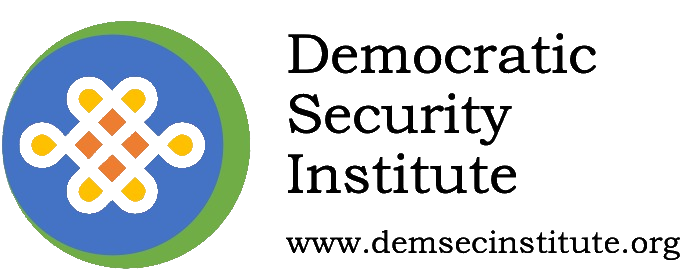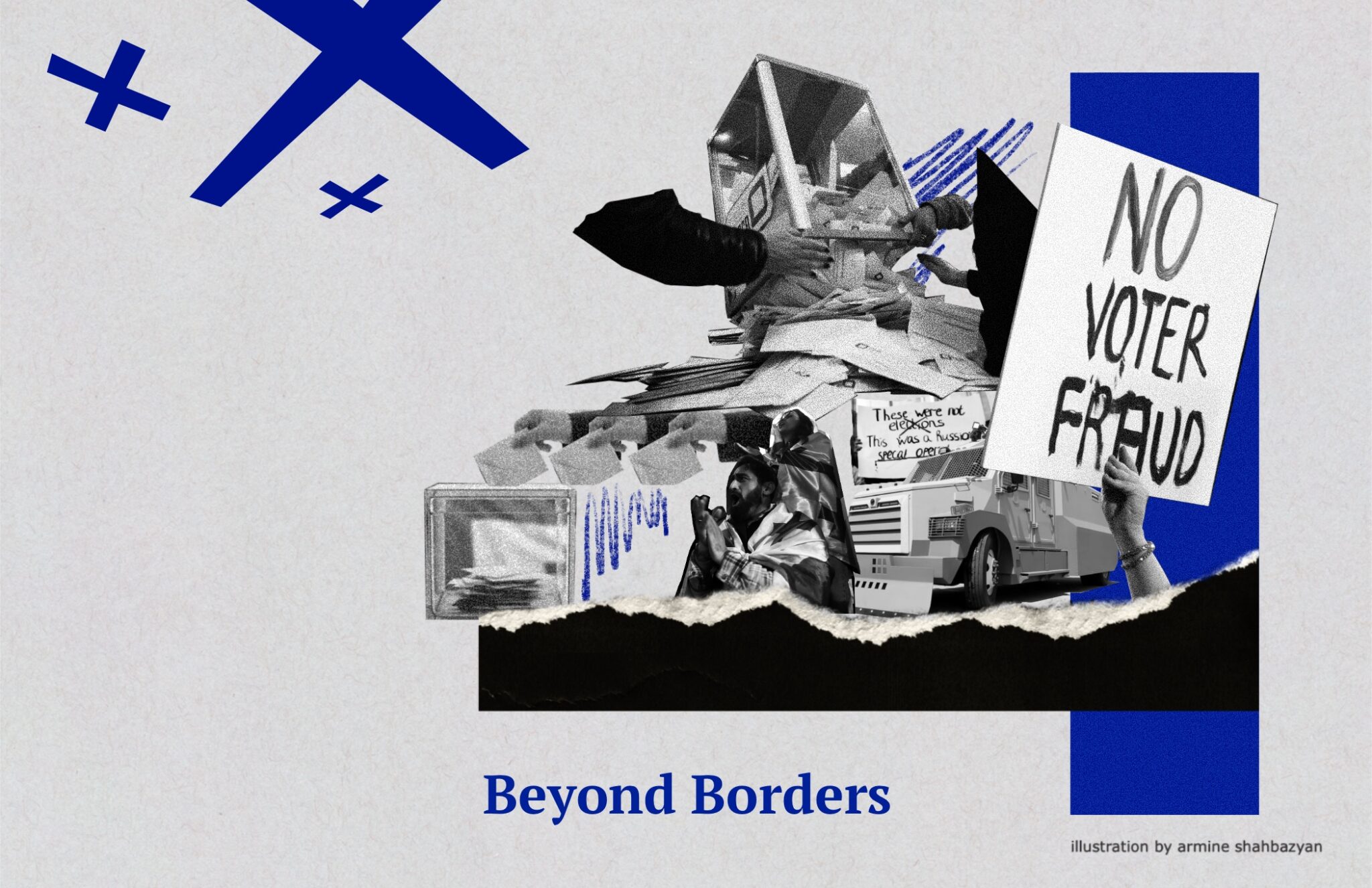This column explores the key issues shaping life in the South Caucasus, focusing on how the divergent paths of Georgia, Armenia and Azerbaijan reflect the region’s complex histories, economic developments, and political shifts. While new generations in these countries grow more isolated from one another due to language barriers and conflicting national trajectories, the same is true for local policymakers, who are often more familiar with distant capitals than their immediate neighbors. Each nation seeks its own path, sometimes in conflict with others, while international actors often treat the region as a whole, reluctant to craft policies specific to individual states. Drawing on personal experience with the region’s revolutions, conflicts and transformations, Olesya brings you Beyond Borders—a column exploring how decisions made in one corner of the South Caucasus impact all who live there.
Read full article on EVN Report’s website
Last Saturday, for a day, I became someone else. For the first time, I held a small but real measure of authority, sanctioned to monitor an election—a role that felt almost like law enforcement. It began with a Facebook ad from a well-regarded local organization recruiting volunteers to observe the polls. I signed up with barely a second thought, and after a series of interviews, training sessions and exams, I found myself outside a polling station at six in the morning on Election Day, clutching a quickly cooling tea in the predawn chill, ready to witness what many were already calling Georgia’s most contentious election in a generation.
Hundreds joined me in the effort. Many had spent the spring in protest, outraged as Georgian Dream began pushing through controversial laws that drew criticism from Western allies and pulled the country closer into Russia’s orbit. For them, this election was about more than choosing the next government; it was about deciding what Georgia would become, and for whom.
Not everyone shared this sense of mission. My arrival at the polling station was met more with glares than greetings. The district I had been assigned to observe turned out to be a battleground, and my official observer’s badge earned me no favors. Outside, men in black clothing and dark sunglasses lingered in clusters, projecting an air of controlled menace. Just inside the entrance, a woman worked the phones, checking voters off her list as they filed in. Nearby, a man sat beside the ballot box, his gaze sharp and watchful. This year, the ballots prepared by the Central Election Commission (CEC) had ink that bled through, making it easy to guess a voter’s choice. For pensioners, public employees, or anyone reliant on government assistance, sidestepping this web of scrutiny felt nearly impossible.
With so much invested in securing votes, it was no surprise that by day’s end—and even a week later—Georgian Dream leaders were unwavering in their claim of victory. The Central Election Commission reported they had won over 50% of the vote, a figure that seemed optimistic, if not improbable, when the party projected it a month before the election. Four opposition parties crossed the threshold for parliament but refused to accept the results, each declaring a boycott. Both domestic and international observers flagged irregularities, and foreign capitals urged Georgia to investigate and consider reruns in contested districts. For now, the situation sits at a tense but quiet impasse, offering a narrow path to resolution—one that could just as easily veer into darker territory.
Despite widespread anticipation, there has been no immediate backlash—for now, the opposition has opted for restraint. Rather than flooding the streets, they have taken time to confer and consolidate their position. So far, this strategy appears effective: two days after the election, thousands gathered in central Tbilisi, rallying against “stolen votes” and calling for a new election. When opposition leaders asked the crowd to disperse, they complied, an unusual deference given the charged atmosphere. Still, this restraint may not hold much longer; each day, factions within the opposition press for bolder action, arguing that diplomacy has run its course.
Street protests are a risky tool. When thousands take to the streets, the situation becomes difficult to control, with ample opportunity for provocations and incidents. The moment violence breaks out, any debate over election integrity will be subsumed by demands for retribution against those responsible for the crackdown. The ensuing blame game between the government and opposition—already so easy to foresee—would leave little to no room for compromise. “No one wants another Maidan,” one opposition politician told me, referring to Ukraine’s 2014 uprising, which unlocked Russia’s annexation of Crimea and the war in Donbass.
Georgian Dream appears equally ready to meet any violence with severe punishment. On the eve of the election, the party’s leaders publicly inspected new riot-control vehicles and equipment, reinforcing their message. Special forces have been stationed in central Tbilisi, close to typical protest sites. Memories of the government’s response to the spring protests are still raw: back then, riot police spiked water cannons with tear gas, compounding the protesters’ suffering. Throughout the campaign, Georgian Dream threatened to imprison opposition leaders, and few were eager to risk providing an excuse, knowing that such arrests could give the ruling party unchecked control over Georgia’s political future.
For now, Georgian Dream shows no willingness to cede an inch to avoid escalating the current standoff. Last Sunday, even as international observers criticized the election’s fairness, party leaders took to social media and state TV to proclaim they had won “with dignity.” When the European Union issued a statement on Wednesday declaring Georgia unprepared for EU membership talks under current conditions, Georgian Dream officials framed it as tacit praise from Brussels.
Yet this facade is unlikely to hold in the long run. According to the Central Election Commission, Georgian Dream claims 90 out of 150 parliamentary seats. Even if they manage to form a government, their legitimacy remains fragile. Georgian Dream lost every district in Tbilisi, including its traditional strongholds, and suffered heavy defeats in Batumi and Rustavi. These losses cast a shadow over their claim to power, one they can’t easily ignore.
In the short term, Georgian Dream’s stance might soften if Western powers take concrete steps. The EU and the United States have jointly demanded an investigation into election irregularities and have called for potential reruns in disputed districts. So far, these calls have been met with deflection, with Georgian Dream delegating inquiries to the prosecutor’s office and the CEC—neither of which inspires much confidence. But if the West moves to impose sanctions on officials linked to electoral fraud, it could pressure Georgian Dream’s leadership to enter discussions about addressing opposition concerns and restoring public trust.
In this unfolding political drama, Armenia’s leadership has found itself in a peculiar bind. On Sunday, Prime Minister Nikol Pashinyan was quick to congratulate Georgian Dream, joining Hungary’s Viktor Orbán and Azerbaijan’s Ilham Aliyev. Pashinyan’s message came even as Georgian observers were raising serious concerns over election irregularities, and before international monitors delivered their scathing assessments. Two days later, leaders from Turkey and China remained notably more cautious, offering general remarks on the election rather than specific endorsements of Georgian Dream or its leadership. Only Venezuela’s Maduro made a similarly explicit statement, congratulating the “progressive left-wing and nationalist government” that he suggested had distanced Georgia from the U.S.
On one level, Yerevan’s eagerness to join what it may have assumed would be a wave of congratulatory statements is understandable. Georgia is landlocked Armenia’s vital trade corridor, linking it to both Russia and the West, and in the past year, Georgia has facilitated shipments of French military aid to Armenia. Still, this logistical lifeline doesn’t rely on any one party in Tbilisi; it’s anchored as much in geography as in diplomacy.
But the issue is more complicated. Armenia’s early endorsement could be seen as an authoritarian-leaning gesture—a surprising signal from a country that recently declared its intent to deepen ties with the West. Worse, it risks appearing as interference in Georgia’s internal affairs: by endorsing Georgian Dream, Armenia’s leadership indirectly strengthens the ruling party’s legitimacy, making it less likely to soften its position with the opposition. Ironically, this stance runs counter to Armenia’s own interests. Any unrest or instability in Georgia would not only threaten Armenia’s trade routes but also raise the prospect of a destabilized northern neighbor—a scenario with serious regional implications.
Whether intentional or not, the timing and tone of Pashinyan’s message could now be seen as a misstep, aligning Armenia with those emboldening Georgian Dream precisely when flexibility and dialogue are most needed. Such signals not only complicate Armenia’s international image but, if a mistake, it’s a costly one. After all, neighbors are supposed to know each other’s complexities better than distant allies to the West.
About the author
Olesya Vartanyan is a conflict analyst with over 15 years of experience in the South Caucasus, specializing in security, peace processes, and foreign policy. She has collaborated with leading international organizations, including the International Crisis Group, OSCE, and Freedom House, where she led research on conflict zones like Abkhazia, Nagorno-Karabakh, and South Ossetia, while contributing to public policy and confidential peace processes. Previously, she worked as a journalist, reporting on security and conflict issues, including groundbreaking coverage for The New York Times during the 2008 Russia-Georgia war. Olesya has received numerous accolades, including the International Young Women’s Peace Award and the EU’s Peace Journalism Prize. She holds master’s degrees from King’s College London and the Georgian Institute of Public Affairs.

